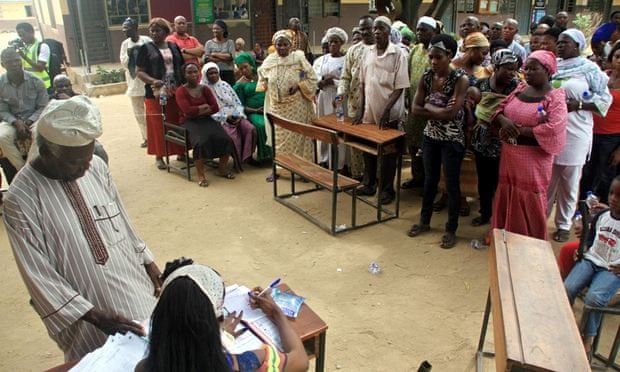Nigeria faces an acid test, whatever the result of this election...

After two days of voting in the most closely contested presidential election in Nigeria’s history, Nigerians will soon find out whether they will have a new president, or whether the current president, Goodluck Jonathan, will have his term extended by four years. The election has proceeded in an orderly and peaceful manner, confounding the prophets of doom who predicted widespread rigging and disruption. Nigerian democracy may just have come of age this past weekend. However, there is still a long way to go and Nigeria has many rivers to cross and much tension to endure while votes are counted and announced.
The opposition All Progressives Congress (APC) party and its presidential candidate, Muhammadu Buhari, campaigned on a platform of change, urging voters to dump the ruling Peoples Democratic Party (PDP). And in a way the APC cannot lose – change has already occurred, regardless of the election winner.
This is because the tenacity with which Nigerians have voted and defied attempts to taint the election has been remarkable. Thousands of refugees created by the bloody insurgency in the north-east of the country defied threats of violence by Boko Haram, who made them homeless, and voted in their refugee camps. In Lagos, people did not just vote but also stayed behind after voting to count votes aloud in public contemporaneously with election officers. When a power cut turned off the lights in the capital, Abuja, undaunted electoral officers continued counting votes using torchlights. Several Nigerians have been posting reports, photos, and videos of events and result sheets from their local polling units, in order to thwart any unscrupulous politicians tempted to “reverse” actual votes tallied. All these are demonstrations of Nigerians finally believing that their votes actually matter after years of disappointment with election rigging. For a change Nigerian politicians are afraid of their own citizens (rather than the other way around) and the threat of losing their jobs due to voter choices.
An unheralded figure in the emergence of this compelling electoral environment is the chairman of the Independent National Electoral Commission (INEC), Professor Attahiru Jega. He has the massive task of managing an election with over 60 million registered voters and 150,000 polling stations. A former university lecturer, his astute management and calm dignity has been an admirable contrast to the shrill political voices. His introduction of biometric readers, which identify voters by reading their thumbprint, has pre-empted attempts at double voting and identity fraud.
Announcing a winner is, on its own, a challenge that requires a review of the fine print of Nigeria’s constitution. In order to win, a presidential candidate must get the most votes and gain at least 25% of the votes in at least two-thirds of Nigeria’s 36 states and the federal capital, Abuja. If no candidate satisfies this complex arithmetic, then a “rematch” election will be staged between President Jonathan and his nearest opposition challenger, Buhari. Results trickling in so far show that the opposition APC is winning by a wide margin in the north (where Buhari is from) and south-west of the country, and that the ruling PDP is winning in the deep south (where President Jonathan is from) and south-east of the country. That means that the so-called “middle belt” states in central Nigeria will determine the winner.
Two things are virtually certain, no matter who wins. The results will be disputed and there will be litigation (especially if the result is close).
An open question is whether either the PDP or APC will be “good losers” if they are defeated. After Nigeria’s last presidential election in 2011, several hundred people were killed in a few days of post-election protests, rioting and violence by members of a defeated party and their rivals. No ruling party has ever lost an election in Nigeria’s 54-year post-independence history. If Jonathan gains the dubious honour of being the first president in Nigerian history to lose an election, no one knows whether he and his ministers will peacefully or willingly vacate the presidential palace for Buhari.
Buhari’s track record suggests that the consequences of losing may be particularly severe for the PDP. Between 1983 and 1985, when Nigeria was under military dictatorship, with Buhari leading the country as a military ruler, he investigated his predecessor government for corruption, as a result of which many politicians were given decades-long prison sentences for corrupt enrichment. Jonathan’s government has itself been dogged by corruption accusations and some members of his party will not exactly be incentivised to surrender power to a rival with a history of sending his predecessors to prison.
Nigeria is on the verge of a seismic political shift. Citizens are holding their breath and hoping that the country can pass the acid test of contested election results and a federal government losing power for the first time
No comments:
Post a Comment